Trigger warning: This article contians mentions of suicide that may be distressing for some readers.
When the phone call came that Saturday night last June, Hilde Hinton remembers going cold, then “shattering into a thousand pieces”. Her brother and “best buddy”, actor Samuel Johnson, had been hit by a car, and it didn’t look good.
Driving to Melbourne’s Alfred Hospital, Hilde saw a convoy of police and ambulance vehicles wailing down Punt Road with Sam inside, and followed him to Emergency. Only four years earlier they’d lost their sister Connie, the inspiration behind the family’s Love Your Sister cancer campaign; Hilde couldn’t face the thought of losing her brother, too.
“I just felt so sick,” she says, “because I kept thinking, ‘Not Sam. Not Sam.’ We’re the last two standing in a way, with our dad and our sister [dying], and I just couldn’t cope with the notion.”
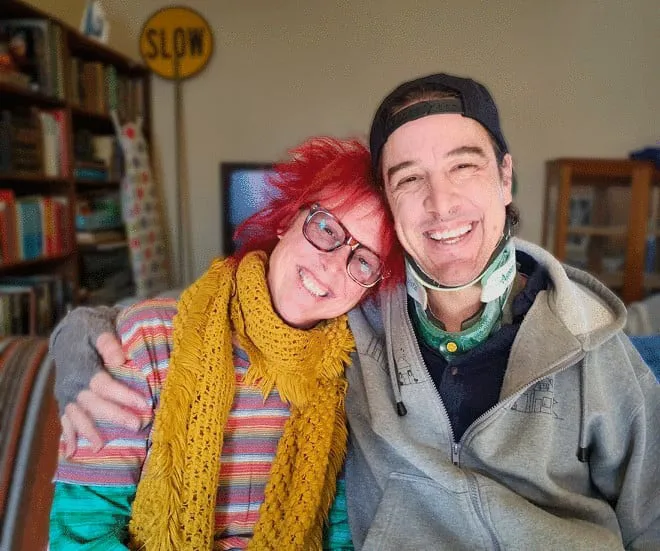
Samuel Johnson with sister Hilde Hinton after the horror car crash that almost killed him.
(Image: Facebook)At the hospital, Sam was rushed to surgery in an induced coma, with a fractured skull, broken neck and bleeding on the brain, while Hilde was ushered away by nurses.
“We were taken to what I call the ‘death room’,” she says, “because when you get taken to a room in a hospital with a couch and a fridge, it’s bad news. The nurse said, ‘Yes, it’s bad.’ That next hourI was in shock.”
When the doctors returned, Hilde was told Sam would make it, but no one knew if he’d be permanently disabled from the brain injury. Because of Melbourne’s COVID lockdown, loved ones weren’t allowed into ICU, so Hilde’s first glimpse of Sam was via an iPad. She saw him face-to-face a few days later.
“He looked a bit banged-up – his face was swollen, he had black eyes – but he looked beautiful to me,” says Hilde. “To see him now is a bit of an amazement because when I first got into intensive care, he could barely speak and he had a Russian accent. I thought, what are we in for? This is going to be a very long road.”
Sam would spend the next couple of months in hospital – the first 12 days with post-traumatic amnesia – learning to walk, talk and write again, at one point not even sure whether he wanted to go on. Hilde was with him every step of the way. The ordeal has only deepened their bond and, he (half) jokes, justified his hero worship of her.
“She’s the lynchpin of our family and I’ve always idolised her,” says 44-year-old Sam. “Now I don’t recommend that – don’t idolise anyone, everyone’s a human, right? But not Hilde. Hilde takes really good care of me, and I feel very lucky because of that. She’s everything I thought she was, so the idolatry continues.”
Sam seems at his most animated, his hands gesturing wildly and his eyes widening above his black mask, when he’s talking about Hilde. With her signature shock of tomato-red hair and a tattoo peeping above the neckline of her faded black T-shirt, Sam’s 52-year-old doppelgänger just laughs at his over-the-top character assessment, looking chuffed all the same.
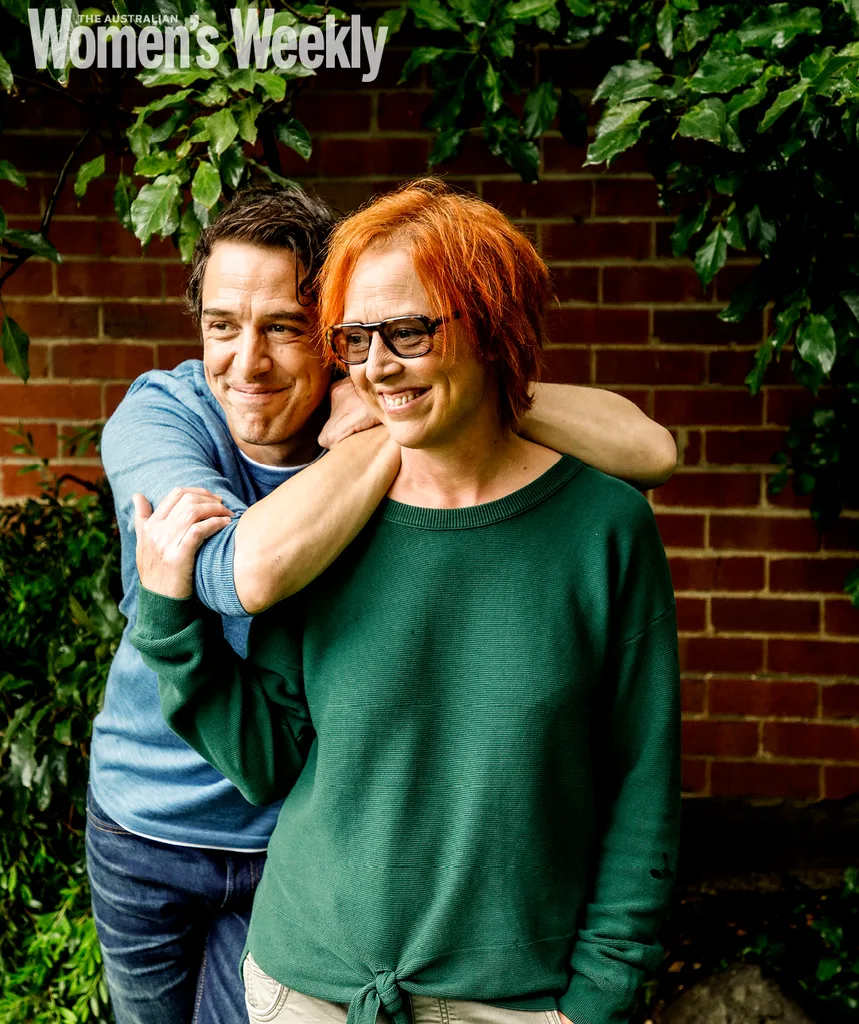
For Sam, Hilde has been a surrogate mother and best friend.
(Image: Julian Kingma/Are Media)In her green weatherboard house in Melbourne’s north, we’re all chatting beside a wall of books in a living room that looks like it’s furnished with op-shop finds and family hand-me-downs; there’s a crocheted granny rug perched on a tired stripey sofa, jigsaw puzzles in a glass cabinet and a road worker’s STOP sign stashed behind the TV. Hilde’s three sons – Jonno, 31, Sullivan, 24, and Austen, 23 – have all moved out, but it’s still the family’s social hub. Dubbed Hilde’s House for the Temporarily Defeated, it has a history of welcoming strays, and has long been Sam’s sanctuary – it’s where he came, post-hospital, to recover.
Hilde took two-and-a-half months away from her full-time job as a prison officer to care for her brother, seeing him every day in hospital, dispensing updates to loved ones, and pretending to be positive, even in what he calls his “loony” first couple of weeks. At one stage, Sam was convinced he was a 12-year-old Japanese girl, and he refused, for days, to have a crucial MRI scan because he feared the machine would turn him into a doughnut.
They can laugh about it now, but the delusions were disturbing at the time. “I’m a bit of a dreamer – ‘Oh, he’s going to be fine’ – I didn’t assume he was going to be so damaged,” says Hilde. “At one point I didn’t know if he was going to get better, and they couldn’t tell me he was going to improve. I thought, ‘I don’t know that he would want to be like this.'”
Sam wasn’t sure, either. “This is a bit taboo, but I’m going to go there,” he says, choosing his words carefully. “I did ask Hilde to kill me at one point. I was pretty convinced that I was going to be a burden. I was completely unsure whether I’d recover, and I begged Hilde to do what she had to do. So shit got pretty hectic.” Although Sam’s request made Hilde sad, she says he was so much better by then that she just dismissed it, and it didn’t come up again.
Within a few days, he was passing memory tests and declared well enough to move on to rehab at the Epworth. Hilde says one of the hardest moments was watching her adult brother point to a picture card and say, “Spoon, cup, bird …”: “He had to work so hard to remember those things and it was so adorable in a way – like six-year-old Sam,” she says. “I’d say, ‘Okay you’re going to have your test in a minute’. And he’d go, ‘Yep. My name is Sam. I had an accident. I’m at the Alfred. And it’s not my fault.'”
The night Sam was hit he’d been driving for more than two hours from his home in Tallarook, 90km north of Melbourne, to have dinner with his cousin in Melbourne’s eastern suburbs. Desperate to go to the toilet, he pulled into a slip lane around dusk and crossed the road to relieve himself. It was on his way back that he was struck by a car travelling 50-60km/h.
Hilde suspects that Sam stepped out onto the road, thinking it was one-way; Sam has no memory of it, but has been told he kept apologising to the ambulance officers. “All of the medical staff told me that you commonly blame yourself,” says Sam, “so I had to say it wasn’t my fault.”
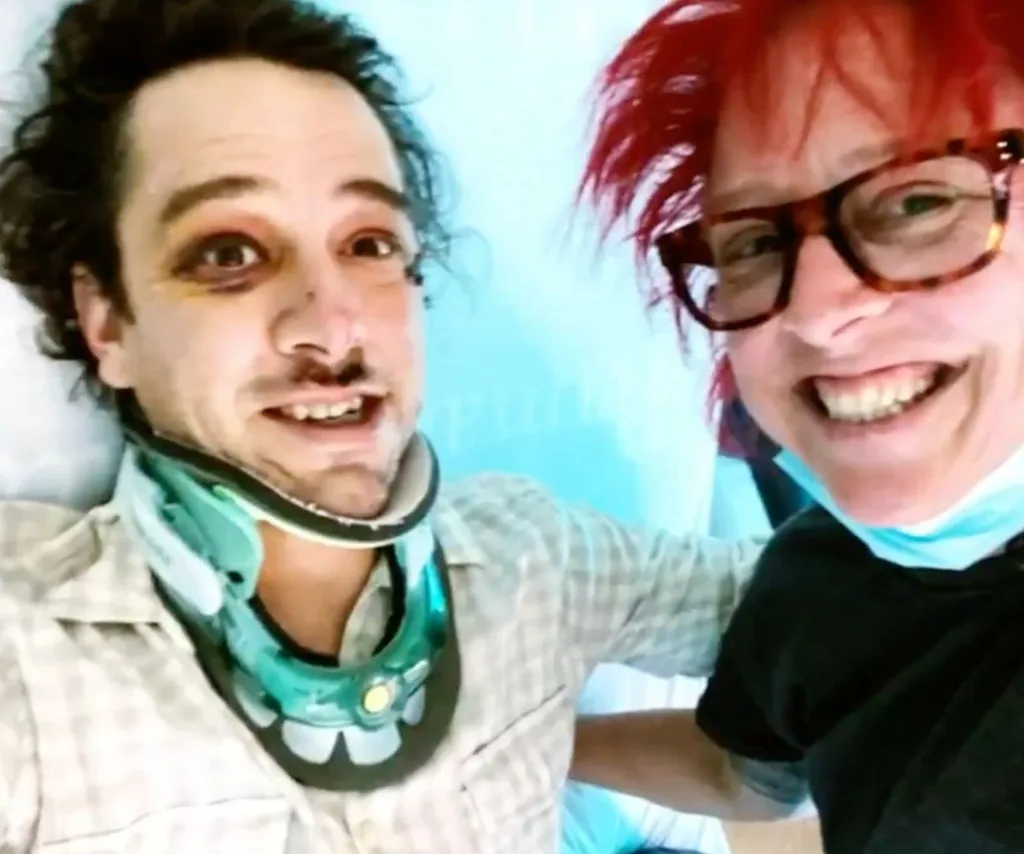
Samuel in the hospital with his sister by his side.
(Image: Samuel Johnson/Channel Ten)The experience has given Sam and Hilde a fresh appreciation of carers and the unique pain they go through, putting on a brave face. Hilde remembers feeling robotic at first: “I was just trying to be that anchor,” she says. “I couldn’t relax, I struggled sleeping, I didn’t know what to do with my emotions, I couldn’t cry. My face fell apart every time I turned my back to put the kettle on.”
Sam’s recovery wasn’t linear, either, so she had to ride the “hope wave”. “One day he could stand up, one day he couldn’t,” she recalls. “His speech regressed. One day we sat there looking out the window with our feet up on the windowsill discussing the Melbourne skyline and I thought, ‘Okay, great.’ Then the next day he was back in bed, could barely talk and couldn’t have the light on. It was up and down.”
Now eight months into an estimated two-year recovery process, Sam has lost his sense of smell and still has balance problems, but he’s back driving, playing tennis and riding his bike. “Basically, I had a to-do with a car and I came out of it all right,” says the 2017 Gold Logie winner, who’s now living back in Tallarook. “I’m still a bit wobbly, I still do a lot of rehab, but I’m as close to back to normal as I could dream.” By way of demonstration, Sam picks up a water bottle from a side table: “That,” he says, “is a major win for me.”
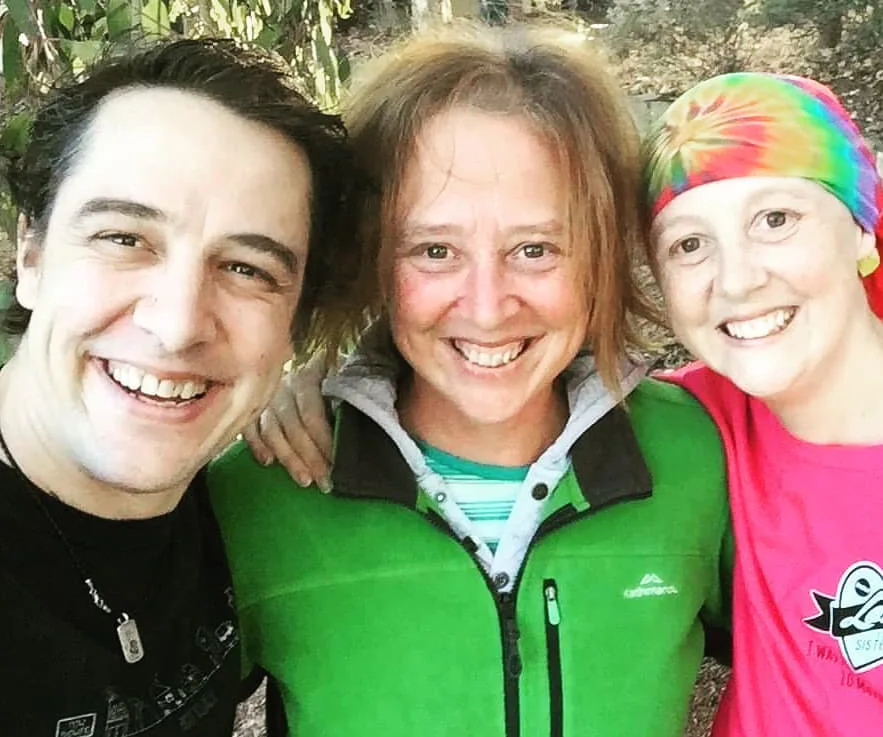
Sam and Hilde with their sister Connie before her sad death.
(Image: Instagram)With their customary optimism, Sam and Hilde have labelled it “the good accident” but, from the outside, it looked particularly cruel, given the family had already weathered more than its fair share of tragedy. It was only September 2017 when 40-year-old Connie died of cancer, the day after receiving the Medal of the Order of Australia. One of Love Your Sister’s almost 600,000 Facebook followers spoke for many when she wrote to Sam: “After everything you’ve been through, and the courage and strength you have shown … to help defeat cancer, I can’t help feel a sense of injustice.”
Since Sam and Connie launched Love Your Sister in 2012, and Sam embarked on a mad unicycling odyssey around Australia the next year, the charity has raised almost $15 million for cancer research, collecting a nationwide “village” of supporters – so when Hilde shared news of Sam’s accident last June, the family was flooded with more than 10,000 messages of love and support. In turn, Sam has chronicled his recovery online, posting entertaining odes to hospital food and inspirational orderlies.
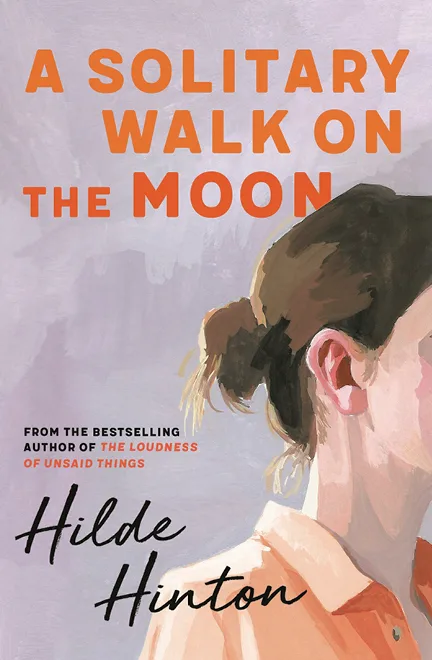
A Solitary Walk on the Moon tells the story of a woman who runs a suburban laundromat and reaches out to the locals most people would walk past.
(Image: Supplied)Hilde is on the Love Your Sister board and was touring Queensland with Sam two years ago – meeting Australians touched by cancer, staying in caravan parks and using coin laundries – when the seeds for her second book were sown. Hilde’s bestselling debut novel, 2020’s The Loudness of Unsaid Things, was based on her mother’s suicide and her own troubled childhood, but the follow-up is entirely fictional.
A Solitary Walk on the Moon, due out on March 30, is about a woman who runs a suburban laundromat and reaches out to the locals most people would walk past: a forgetful man, a neglected little boy, a woman with a nasty boyfriend.
WATCH: Samuel Johnson’s charity ‘Love Your Sister’ hits $10 million. Story continues after video.
Just wanting to be helpful, the cantankerous but lovable Evelyn – reminiscent of the Elizabeth Strout character Olive Kitteridge – inserts herself in the everyday dramas going on all around her. She wears abandoned mismatched socks and gumboots to the beach and sticks her nose where it arguably doesn’t belong.
“I wanted to write about a character that nobody knew whether they liked or loathed,” explains Hilde, “[to show] that everybody has foibles but it’s okay to unashamedly be yourself.”
Once again she explores the world of a vulnerable child with a struggling parent. “A lot of people assume children to be silly and stupid, and they’ve got just as much comprehension and intelligence as we do – they just don’t know how to express it, they’re powerless,” says Hilde, who submitted the manuscript the day before Sam’s accident. “It’s a terrible plight, being young, in many ways, and I think we forget it. People dismiss the young; I think they’re terrific.”
A Solitary Walk on the Moon is a warm, tender tale of supposedly “ordinary” people, told on a small neighbourhood scale, but it’s also a rumination on no less than what it means to live a good life. It says a lot about its writer, who for decades has created a family beyond blood relatives, offering a leg-up to people doing it tough.
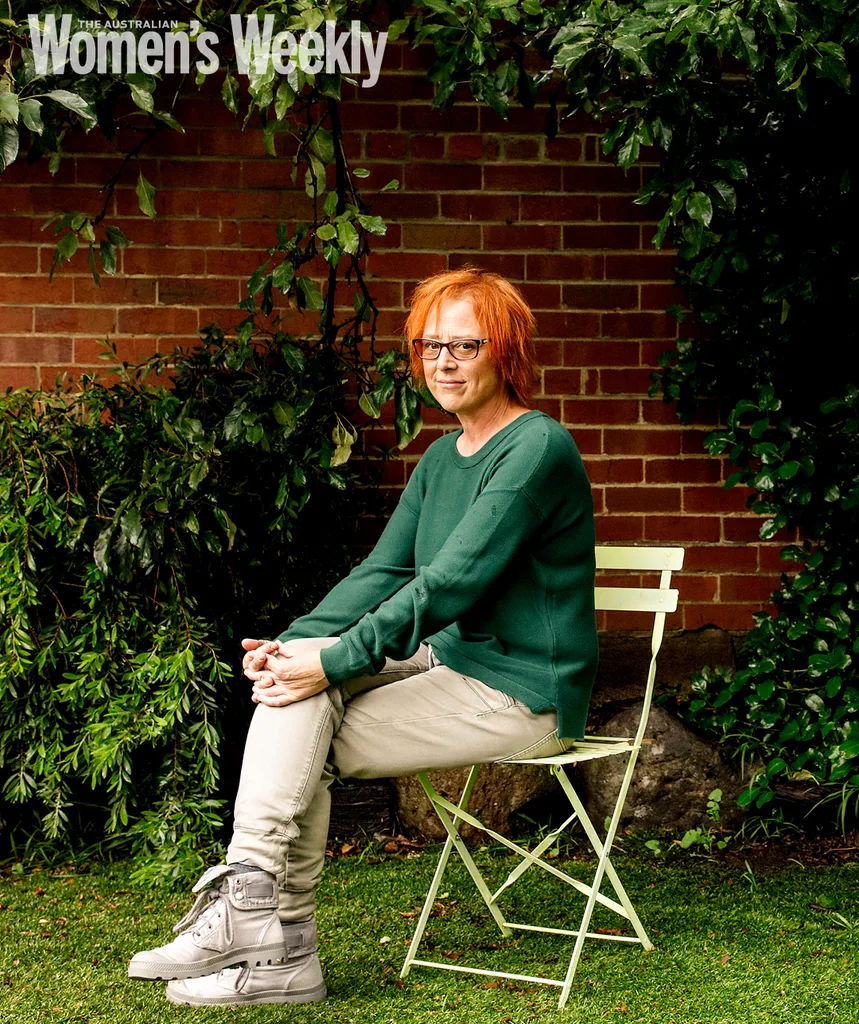
“She taught me I could chase anything and the last thing I needed to do was listen to people,” Sam says of Hilde.
(Image: Julian Kingma/Are Media)Hilde knows a bit about what that’s like. Her parents broke up soon after Sam was born, and her mentally unwell mother, Merrill, a poet, took her own life when Hilde was 12, Connie was four and Sam three. It was Hilde who found her. Growing up in Melbourne without a TV, the Johnson kids played imaginary games, while their writer dad, Joe, renovated houses to supplement his income. At 15, Hilde moved to Sydney by herself, living in share houses while finishing high school. After having her first child at 20, Hilde came back to Melbourne to look after 12-year-old Connie when she was diagnosed with the first of three bouts of cancer.
For Sam, Hilde has been a surrogate mother and best friend – the one who encouraged him to live big. “She taught me I could chase anything and the last thing I needed to do was listen to people,” he says. “The reason I have a go-for-it part of me is because of my sister Hilde. She taught me how to fly.”
She’s also been there to break his fall. “She’s always looked after me,” says Sam, who lost his girlfriend to suicide in 2006 and later struggled with depression. The latest trauma, he says, has actually made him more relaxed.
WATCH: Behind The Scenes of Samuel Johnson’s photoshoot with Who. Story continues after video.
“I haven’t lost my shit since the accident,” says Sam. “Because I was overinvested in everything, I would overreact. I know we all mellow out, but the accident has definitely helped me deal with my anxiety and my fear. I had a classic near-death experience and maybe I just want to be chilled-out because I have another crack at things now. I’m not going to drop a lolly and get emotional.”
For Hilde, the accident has made her re-evaluate her life and appreciate it anew. “I’m writing more, seeing family and friends more, painting more walls – I’m just doing more,” she says. “Because it’s all too short. It was a great realisation that I don’t actually want to throw it all in and do something else; I’m actually very happy with my life and I’m living my dreams. I can’t believe that I’m a writer.”
What a difference two years can make. When we last met, just before her first book came out, Hilde was wracked with self-doubt and it was Sam’s pushing that had propelled her to write; now she’s self-powered, she says, “and it’s invigorating”. Not only that, after being “determinedly” single, she’s in a relationship – with 54-year-old former publisher Sandy Weir. As we chat, Sandy’s ancient one-eyed pug Bess (“a loaf of bread that looks like a dog,” says Sam) lumbers into the living room for a pat.
“Hilde’s gone from being queen bee of the family, with strays everywhere, to finding love,” says Sam. “The whole family is over the moon. So now she’s got a blind pug and a partner, I’ve basically been relegated.”
When Sam started Love Your Sister he promised that he wouldn’t go back to acting until he raised $10 million. Now that that box has been ticked, he’s back on the audition circuit after starring in the Stan drama Eden last year. Ultimately, though, he’d like to write, and seeing his sister’s literary success has only inspired him to lift his game.
Despite the brother-sister love-fest it seems there might be some sibling rivalry, too. “Dad was a writer and Mum was a poet, so we are hardwired to love this stuff,” says Sam. “I have massive ambitions to be a writer. Connie wanted to be a writer too; we all dreamed of the life that Hilde’s got. So can Hilde write? F*ck yeah! Is she the better writer? Yeah. Will she be the better writer in 10 years? We’ll see.”
If you or someone you know has been affected by any of the issues raised in this article, help is always available. Call Lifeline on 13 11 14.
You can read this story and many others in the April issue of The Australian Women’s Weekly – on sale now
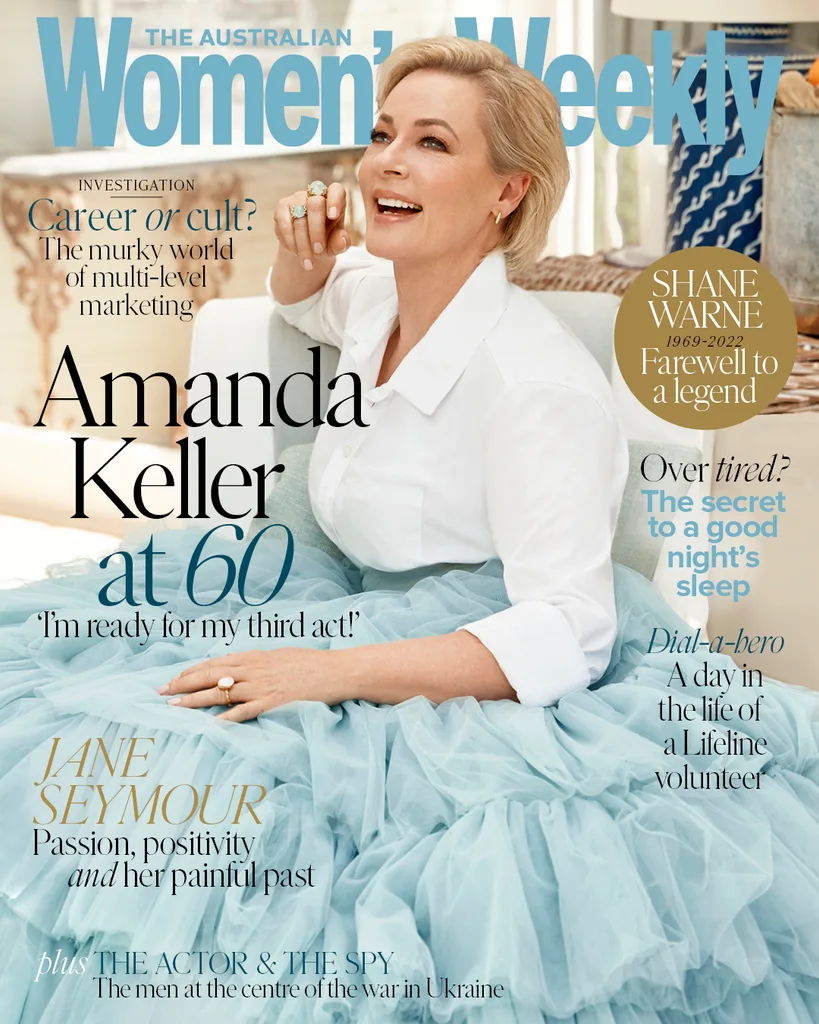
.jpg?resize=380%2C285)
.jpg?resize=380%2C285)
